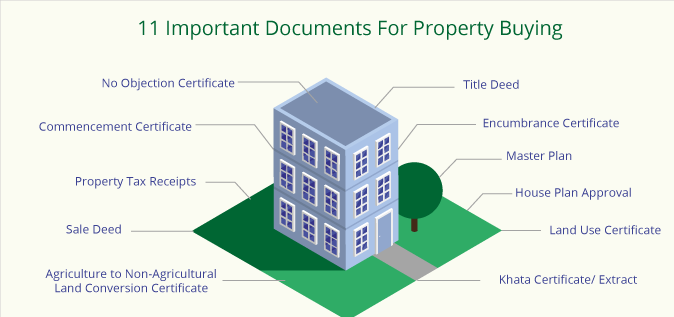
how to verify property documents in maharastra ?
how to verify property documents in maharastra ?
1. Title Deed for
- Check the Original Title Deed: Verify the title deed for the authenticity of ownership. It should be in the name of the seller and should be free from any encumbrances.
- Encumbrance Certificate (EC): Obtain the Encumbrance Certificate from the Sub-Registrar's office. This certificate shows all the registered transactions related to the property, ensuring there are no legal dues.
2. Property Tax Receipts
- Verify Property Tax Receipts: Ensure that all property taxes have been paid up to date. Check the tax receipts to confirm there are no outstanding dues.
- Non-Agricultural (NA) Order: For properties converted from agricultural to non-agricultural use, ensure the NA order is obtained from the Revenue Department.
3. Sale Agreement
- Draft a Sale Agreement: The sale agreement should clearly state the terms and conditions of the sale, including the sale price, advance payment, and possession date.
- Witnesses: Ensure that the agreement is signed by both parties and witnessed by reliable individuals.
4. Approval Plans and Occupancy Certificate
- Building Plan Approval: Verify that the building plans have been approved by the local municipal authority.
- Completion Certificate: For completed buildings, check the completion certificate issued by the local municipal authority.
- Occupancy Certificate (OC): Ensure that the Occupancy Certificate has been issued by the local municipal authority, certifying that the building is ready for occupancy and has been constructed according to the approved plans.
5. Land Use Certificate
- Zoning Regulations: Verify that the property complies with the zoning regulations and land use norms specified by the local authority.
6. Release Certificate
- Loan Clearance: If the property was purchased on a loan, ensure that the seller has obtained a release certificate from the bank, indicating that the loan has been fully repaid.
7. NOC from Society or Builder
- Society NOC: For properties in a housing society, obtain a No Objection Certificate (NOC) from the society.
- Builder NOC: If buying directly from the builder, ensure that there is an NOC from the builder confirming the sale.
8. Verify Seller’s Identity and Authority
- Identity Proof: Verify the seller’s identity with documents such as Aadhar card, PAN card, or passport.
- Power of Attorney: If the seller is not the original owner, verify the Power of Attorney document to ensure the person has the authority to sell the property.
9. Due Diligence and Legal Scrutiny
- Hire a Lawyer: It is advisable to hire a real estate lawyer to conduct a thorough legal scrutiny of all documents.
- Legal Opinion: Obtain a legal opinion from the lawyer confirming that the property has a clear title and there are no legal disputes.
10. Registration of Sale Deed
- Draft Sale Deed: Have the sale deed drafted by a qualified lawyer.
- Register the Sale Deed: The sale deed must be registered at the Sub-Registrar's office. Both buyer and seller should be present along with witnesses. Pay the required stamp duty and registration fees.
Additional Tips
- Check Online Portals: Use online services provided by the Maharashtra government to check land records and property details.
- Survey Records: Verify the survey records to ensure the property boundaries and dimensions are accurate.
By following these steps, you can ensure that the propertiesdocuments are thoroughly verified and the transaction is legally sound.








